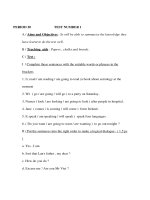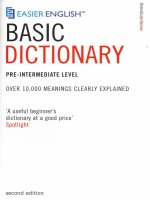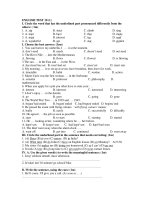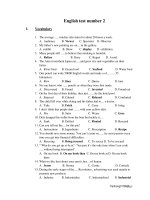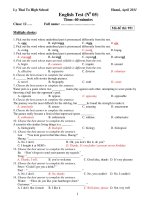English test (Number 1) pot
Bạn đang xem bản rút gọn của tài liệu. Xem và tải ngay bản đầy đủ của tài liệu tại đây (57.53 KB, 8 trang )
English test (Number 1)
I. Choose the word whose underlined part is pronounced differently from other words.
1. A. won B. gone C. none D. son
2. A. bear B. hear C. tearing D. pear
3. A. comfortable B. come C. some D. comb
4. A. arrived B. linked C. lived D. opened
5. A. spread B. bread C. bleach D. breath
II. Choose the word whose stress pattern is different from other words.
6. A. attempt B. presentation C. residential D. confidential
7. A. physical B. approval C. recorder D. suspicion
8. A. elegant B. arrogant C. departure D. fortunate
9. A. dictionary B. receive C. productive D. necessity
10. A. carriage B. frightened C. sincere D. corridor
III. Choose the best option to fill in the blank.
11. Her brother never gives up; he’s so……………
A. powerful B. persuading C. persevering D. tiring
12. Today’s football match has been……………because of bad weather. They will play next Saturday instead.
A. cancelled B. postponed C. put away D. decided
13. The other driver failed to signal his………… to turn right so I had to brake suddenly.
A. purpose B. idea C. intention D. design
14. The hen has just………… an egg.
A. lain B. laid C. lied D. lay
15. I don’t have as many………… goals as I did when I was younger.
A. untrue B. unreal C. incorrect D. unrealistic
16. The director retired early……………… ill-health.
A. on behalf of B. ahead of C. on account D. in front of
17. I’m not………………with that particular expression.
A. aware B. common C. agree D. familiar
18. What comes out of a car exhaust is called………….
A. clouds B. fumes C. scents D. petrol
19. Since he moved house, he hasn’t had much…………….with his friends.
A. connection B. contact C. business D. meeting
20. She wondered…………….her father looked like now, after so many years away.
A. how B. whose C. that D. what
21. If you are ……… , you know about something because you’ve done it before.
A. enthusiastic B. hard-working C. exceptional D. experienced
22. If you go on ahead, I’ll …………… you later.
A. catch up on B. catch up with
C. fit in with D. walk out on
23. The children had been……………of the danger, but had taken no notice.
A. warned B. explained C. prevented D. shown
24. Walking down the street, she noticed a long…………….of houses, all exactly alike.
A. queue B. row C. rank D. tail
25. The……………at the football match cheered their team on.
A. audience B. onlookers C. bystanders D. spectators
26. She asked me……… to another country in the region.
A. weather I had been B. if I had been
C. I had been D. had I been
27. I wish you………….here with me now.
A. would be B. will be C. were D. had been
28. …………I love you, I can’t let you do whatever you like.
A. Much as B. Whatever C. Whether D. Despite
29. I………… on the beach this time tomorrow.
A. will lie B. will be lying C. am going to lie D. will have lied
30. Our parents don’t allow……………out after midnight.
A. to go B. us go C. us going D. going
31. Not only…………… more brittle than hard maples, but they are also less able to withstand high winds.
A. soft maples are B. are soft maples
C. they are soft maples D. soft maples
32. Some people are………… interested in animals than in other people.
A. further B. far more C. much D. most
33. “I left a cookie on the table, but now it’s gone. What happened to it?” “I don’t know. One of the
children……………… it”
A. may have eaten B. could eat
C. had to eat D. should have eaten
34. I was enjoying my book, but I stopped…………………….a program on TV.
A. reading to watch B. to read to watch
C. to read for watching D. reading for to watch
35. The smoke from burning fuels causes pollution if…………….into the atmosphere.
A. it releases B. it is released C. it will be released D. it released
36. ………….you should do first is make a list of all the things you have to do.
A. That B. what C. As D. If
37. Can you remember the first time you…………in love?
A. fell B. felt C. went D. found
38. Don’t try to phone me. By the time you read this letter, …………
A. I’ll have left B. I’ve left C. I’ll leave D. I’m leaving
39. Gerry isn’t fat. ……………… , he’s quite skinny.
A. In any case B. By rights C. In practice D. On the contrary
40. “When are you going to ask your boss for a raise?”
“………….to her twice already! I don’t think she wants to give me one.”
A. I’ve talked B. I’ve been talking C. I was talking D. I’d talked
41. “What a nice day it is!” “…………… ”
A. I love beautiful weather B. It’s Sunday today.
C. It’s on Sunday. D. Yes, why don’t we go on for a picnic?
42. “How are you doing?” “………………”
A. Great. Thanks B. Yes, I am C. I’m reading a novel D. I’m afraid not
43. “You’ve really changed.” “…………….”
A. Yes, I am B. I’ll never change my mind
C. Have I? D. Oh, sorry, I can’t
44. “………………………” “No, thank you. That will be all.”
A. What would you like B. It’s very good of you to help me
C. What kind of beef do you like D. Would you like anything else
45. “Do you want me to help you with those packages?”
A. No, those aren’t mine. B. No, I can handle them myself.
C. No, I can’t help you right now D. Of course, not for me.
IV. From the four underlined words or phrases identify the one that is not correct.
46. The salad tasted so well that my brother returned to the salad bar for another helping.
47. We thought our cameras were the same, but his is different than the one that I bought.
48. Louise is the more capable of the three girls who have tried out for the part in the play.
49. They played so good game of tennis last night that they surprised their audience.
50. I would rather that they do not travel during the bad weather, but they insist that they must return home
today.
V. Read the passage and choose the best answer.
Emma Ilarte, in Barbara Taylor Bradford's novel, was a poor lonely girl who became the (51) owner
of an international chain of stores. Like the woman she writes about, Ms Bradford is beautiful and (52)
She left school at sixteen and became a (53) After twenty-three years of this work, she made
the (54) to start writing novels. She is now one of the most (55) paid novelists in the world.
Was Emma Ilarte's story based on Ms Bradford's own (56) successful life? "I'm afraid not," she said
with (57) "My life has been quite different from Emma Harte's. She was (58) to be born into a
poor family. I came from a middle-class home and I'm (59) married to a rich American film producer.
The only thing I share with my heroine is her (60) to work hard."
51. A wealth B unhealthy C richness D wealthy
52. A ambition B ambitious C greed D greedy
53. A journal B report C journalist D newspaperman
54. A decide B decided C decisive D decision
55. A high B badly C highly D height
56. A incredible B incredibly C credible D credibly
57. A amusement B amuse C amused D amusing
58. A luck B lucky C unlock D unlucky
59. A happy B happiness C happily D unhappily
60. A ability B unable C able D possibility
VI. Read the passage then choose the best answer to each question.
Hatred is a fundamental emotion that has deep roots in society and culture. Psychologists believe that group
identity and cohesion depend on a large extent on having a common enemy. It seems that the existence of “bad guys” is
an important element in defining who are within a larger realm. It could be said that human beings love to hate.
The first signs appear early in life when a child, faced with blame for some mistake, immediately accuses
another child or an inanimate object such as a teddy bear. Later, on the schoolyard playground, children in rival groups
vie for attention and influence. These basic responses translate into more powerful emotion later in life.
One area where deep-rooted hatred is exhibited is in the ethnic clashes that constantly occur around the globe.
These conflicts are not only over territory but also involve emotional issues of group identity and unity of purpose. For
many, there is no “us” without a “them” to hate. In a world where conflict between superpowers is on the decline, it may
be that humanity will have difficulty adapting to a state of mutual respect and cooperation.
61. Which of the following is the best title for the passage?
A. Roots of Society B. Group Unity
C. A Basic Emotion D. Social and Cultural Problem
62. According to the passage, what is believed to be an important aspect of defining group identity?
A. Facing a common enemy B. Being reluctant to hate
C. Accepting blame for past actions D. Ignoring a larger realm
63. In paragraph 2, the word vie could best be replaced by which of the following?
A. cooperate B. compete C. manipulate D. defend
64. According to the passage, early childhood responses to blame……………….
A. are not related to stronger feeling in adulthood. B. are complex expression of emotions
C. demonstrate how human beings love to hate D. are not well understood by psychologists
65. The author suggests that when children make mistakes, they……………
A. join rival gangs on schoolyard playgrounds B. rarely accept responsibility for their actions
C. need emotional support from personal objects like teddy bears D. readily admit to their errors.
VII. Choose the correct sentence which has the same meaning as the given one.
66. It would have been better if he had told us his new address.
A. He might have told us his new address. B. He should have told us his new address.
C. He must have told us his new address. D. It doesn’t matter that he didn’t tell us his new address.
67. “Can you explain it in another way?” she said.
A. She asked him if he can explain it in another way.
B. She asked him to explain it in a different way.
C. She asked him whether he could explain another way to it.
D. She asked him could he explain it again.
68. Tom regrets to say that he has left the tickets at home.
A. Tom regrets leaving the tickets at home. B. Tom is sorry that he has left the tickets at home.
C. Tom wishes he hadn’t left the tickets at home. D. Tom regrets to leave the tickets at home.
69. The way he behaves annoys me sometimes.
A. I was annoyed with his way of behaving. B. I’m sometimes annoyed by the way he behaves.
C. His behaviour is annoying to me. D. I find his behaviour very annoying.
70. “You broke my pair of glasses,” the woman said.
A. The woman blames me of breaking her pair of glasses.
B. The woman blamed me of breaking her pair of glasses.
C. The woman blames me for having broken her pair of glasses.
D. The woman blamed me for having broken her pair of glasses.
71. The bad weather prevented the train from running.
A. The bad weather stopped the running train.
B. The train was precluded from running by the nasty weather.
C. The running of the train prevented by the bad weather.
D. The train prevented the bad weather from running.
72. Bob had better go before it gets dark.
A. It’s dark now, and Bob ought to have gone before.
B. Bob had left before it got dark.
C. It’s better for Bob to leave in the darkness.
D. Bob should go while it’s still daylight.
73. You can enrich your knowledge by listening to the radio.
A. You can be rich if you listen to the radio.
B. Listening to the radio makes you know less.
C. Listening to the radio can make you know more.
D. Listening to the radio enables you to be rich.
74. ………………….that she burst into tears.
A. Such was angry girl B. So angry she was
C. She was angry so D. Her anger was such
75. Not only…………………….visit Japan but they plan to stop off in the USA as well.
A. they plan to B. they must C. will they D. are they paying
76. On……………….he had won, he jumped for joy.
A. telling B. he was told C. being told D. having told
77. “I’m sorry I have to leave so early,” she said.
A. She apologized for having to leave so earlier.
B. She apologized for having to leave early.
C. She regretted to have left so early.
D. She left early, and she feels sorry now.
78. He offered to help her with the heavy suitcase, which was kind.
A. The suitcase which he offered to help her with was kind.
B. It was kind of him to offer to help her with the suitcase.
C. He offered to help her but the suitcase was too heavy.
D. It was kind of her to have him help with the suitcase.
79. If you are disappointed with an inexpensive bicycle, then save your money for a more expensive model.
A You should save up to buy a more expensive bicycle if your inexpensive one disappoints you.
B An inexpensive bicycle is disappointing, so buy an expensive one.
C A more expensive bicycle saves you much money, so don't buy an inexpensive model.
D You'd better buy an inexpensive bicycle to save more money.
80. You should take regular exercises instead of sitting in front of the television all day.
A Sitting in front of the television all day and taking exercises is advisable.
B Don't take regular exercises, just sit in front of the television all day instead.
C Sitting in front of the television all day helps you take regular exercises.
D Taking regular exercises is better than sitting in front of the television all day.
Tuesday, May 04, 2010
English test (Number……… )
I. Choose the word whose underlined part is pronounced differently from other words.
1. A. won B. gone C. none D. son
2. A. bear B. hear C. tearing D. pear
3. A. comfortable B. come C. some D. comb
4. A. arrived B. linked C. lived D. opened
5. A. spread B. bread C. bleach D. breath
II. Choose the word whose stress pattern is different from other words.
6. A. attempt B. presentation C. residential D. confidential
7. A. physical B. approval C. recorder D. suspicion
8. A. elegant B. arrogant C. departure D. fortunate
9. A. dictionary B. receive C. productive D. necessity
10. A. carriage B. frightened C. sincere D. corridor
III. Choose the best option to fill in the blank.
11. Her brother never gives up; he’s so……………
A. powerful B. persuading C. persevering D. tiring
12. Today’s football match has been……………because of bad weather. They will play next Saturday instead.
A. cancelled B. postponed C. put away D. decided
13. The other driver failed to signal his………… to turn right so I had to brake suddenly.
A. purpose B. idea C. intention D. design
14. The hen has just………… an egg.
A. lain B. laid C. lied D. lay
15. I don’t have as many………… goals as I did when I was younger.
A. untrue B. unreal C. incorrect D. unrealistic
16. The director retired early……………… ill-health.
A. on behalf of B. ahead of C. on account D. in front of
17. I’m not………………with that particular expression.
A. aware B. common C. agree D. familiar
18. What comes out of a car exhaust is called………….
A. clouds B. fumes C. scents D. petrol
19. Since he moved house, he hasn’t had much…………….with his friends.
A. connection B. contact C. business D. meeting
20. She wondered…………….her father looked like now, after so many years away.
A. how B. whose C. that D. what
21. If you are ……… , you know about something because you’ve done it before.
A. enthusiastic B. hard-working C. exceptional D. experienced
22. If you go on ahead, I’ll …………… you later.
A. catch up on B. catch up with
C. fit in with D. walk out on
23. The children had been……………of the danger, but had taken no notice.
A. warned B. explained C. prevented D. shown
24. Walking down the street, she noticed a long…………….of houses, all exactly alike.
A. queue B. row C. rank D. tail
25. The……………at the football match cheered their team on.
A. audience B. onlookers C. bystanders D. spectators
26. She asked me……… to another country in the region.
A. weather I had been B. if I had been
C. I had been D. had I been
27. I wish you………….here with me now.
A. would be B. will be C. were D. had been
28. …………I love you, I can’t let you do whatever you like.
A. Much as B. Whatever C. Whether D. Despite
29. I………… on the beach this time tomorrow.
A. will lie B. will be lying C. am going to lie D. will have lied
30. Our parents don’t allow……………out after midnight.
A. to go B. us go C. us going D. going
31. Not only…………… more brittle than hard maples, but they are also less able to withstand high winds.
A. soft maples are B. are soft maples
C. they are soft maples D. soft maples
32. Some people are………… interested in animals than in other people.
A. further B. far more C. much D. most
33. “I left a cookie on the table, but now it’s gone. What happened to it?” “I don’t know. One of the
children……………… it”
A. may have eaten B. could eat
C. had to eat D. should have eaten
34. I was enjoying my book, but I stopped…………………….a program on TV.
A. reading to watch B. to read to watch
C. to read for watching D. reading for to watch
35. The smoke from burning fuels causes pollution if…………….into the atmosphere.
A. it releases B. it is released C. it will be released D. it released
36. ………….you should do first is make a list of all the things you have to do.
A. That B. what C. As D. If
37. Can you remember the first time you…………in love?
A. fell B. felt C. went D. found
38. Don’t try to phone me. By the time you read this letter, …………
A. I’ll have left B. I’ve left C. I’ll leave D. I’m leaving
39. Gerry isn’t fat. ……………… , he’s quite skinny.
A. In any case B. By rights C. In practice D. On the contrary
40. “When are you going to ask your boss for a raise?”
“………….to her twice already! I don’t think she wants to give me one.”
A. I’ve talked B. I’ve been talking C. I was talking D. I’d talked
41. “What a nice day it is!” “…………… ”
A. I love beautiful weather B. It’s Sunday today.
C. It’s on Sunday. D. Yes, why don’t we go on for a picnic?
42. “How are you doing?” “………………”
A. Great. Thanks B. Yes, I am C. I’m reading a novel D. I’m afraid not
43. “You’ve really changed.” “…………….”
A. Yes, I am B. I’ll never change my mind
C. Have I? D. Oh, sorry, I can’t
44. “………………………” “No, thank you. That will be all.”
A. What would you like B. It’s very good of you to help me
C. What kind of beef do you like D. Would you like anything else
45. “Do you want me to help you with those packages?”
A. No, those aren’t mine. B. No, I can handle them myself.
C. No, I can’t help you right now D. Of course, not for me.
IV. From the four underlined words or phrases identify the one that is not correct.
46. The salad tasted so well that my brother returned to the salad bar for another helping.
47. We thought our cameras were the same, but his is different than the one that I bought.
48. Louise is the more capable of the three girls who have tried out for the part in the play.
49. They played so good game of tennis last night that they surprised their audience.
50. I would rather that they do not travel during the bad weather, but they insist that they must return home
today.
46. A 47. C 48. A 49. B 50. B
V. Read the passage and choose the best answer.
Emma Ilarte, in Barbara Taylor Bradford's novel, was a poor lonely girl who became the (51) owner of an
international chain of stores. Like the woman she writes about, Ms Bradford is beautiful and (52) She left
school at sixteen and became a (53) After twenty-three years of this work, she made the (54) to start
writing novels. She is now one of the most (55) paid novelists in the world.
Was Emma Ilarte's story based on Ms Bradford's own (56) successful life? "I'm afraid not," she said with (57)
"My life has been quite different from Emma Harte's. She was (58) to be born into a poor family. I came
from a middle-class home and I'm (59) married to a rich American film producer. The only thing I share with
my heroine is her (60) to work hard."
51. A wealth B unhealthy C richness D wealthy
52. A ambition B ambitious C greed D greedy
53. A journal B report C journalist D newspaperman
54. A decide B decided C decisive D decision
55. A high B badly C highly D height
56. A incredible B incredibly C credible D credibly
57. A amusement B amuse C amused D amusing
58. A luck B lucky C unlock D unlucky
59. A happy B happiness C happily D unhappily
60. A ability B unable C able D possibility
VI. Read the passage then choose the best answer to each question.
Hatred is a fundamental emotion that has deep roots in society and culture. Psychologists believe that group
identity and cohesion depend on a large extent on having a common enemy. It seems that the existence of “bad guys” is
an important element in defining who are within a larger realm. It could be said that human beings love to hate.
The first signs appear early in life when a child, faced with blame for some mistake, immediately accuses
another child or an inanimate object such as a teddy bear. Later, on the schoolyard playground, children in rival groups
vie for attention and influence. These basic responses translate into more powerful emotion later in life.
One area where deep-rooted hatred is exhibited is in the ethnic clashes that constantly occur around the globe.
These conflicts are not only over territory but also involve emotional issues of group identity and unity of purpose. For
many, there is no “us” without a “them” to hate. In a world where conflict between superpowers is on the decline, it may
be that humanity will have difficulty adapting to a state of mutual respect and cooperation.
61. Which of the following is the best title for the passage?
A. Roots of Society B. Group Unity
C. A Basic Emotion D. Social and Cultural Problem
62. According to the passage, what is believed to be an important aspect of defining group identity?
A. Facing a common enemy B. Being reluctant to hate
C. Accepting blame for past actions D. Ignoring a larger realm
63. In paragraph 2, the word vie could best be replaced by which of the following?
A. cooperate B. compete C. manipulate D. defend
64. According to the passage, early childhood responses to blame……………….
A. are not related to stronger feeling in adulthood. B. are complex expression of emotions
C. demonstrate how human beings love to hate D. are not well understood by psychologists
65. The author suggests that when children make mistakes, they……………
A. join rival gangs on schoolyard playgrounds B. rarely accept responsibility for their actions
C. need emotional support from personal objects like teddy bears D. readily admit to their errors.
VII. Choose the correct sentence which has the same meaning as the given one.
66. It would have been better if he had told us his new address.
A. He might have told us his new address. B. He should have told us his new address.
C. He must have told us his new address. D. It doesn’t matter that he didn’t tell us his new address.
67. “Can you explain it in another way?” she said.
A. She asked him if he can explain it in another way.
B. She asked him to explain it in a different way.
C. She asked him whether he could explain another way to it.
D. She asked him could he explain it again.
68. Tom regrets to say that he has left the tickets at home.
A. Tom regrets leaving the tickets at home. B. Tom is sorry that he has left the tickets at home.
C. Tom wishes he hadn’t left the tickets at home. D. Tom regrets to leave the tickets at home.
69. The way he behaves annoys me sometimes.
A. I was annoyed with his way of behaving. B. I’m sometimes annoyed by the way he behaves.
C. His behaviour is annoying to me. D. I find his behaviour very annoying.
70. “You broke my pair of glasses,” the woman said.
A. The woman blames me of breaking her pair of glasses.
B. The woman blamed me of breaking her pair of glasses.
C. The woman blames me for having broken her pair of glasses.
D. The woman blamed me for having broken her pair of glasses.
71. The bad weather prevented the train from running.
A. The bad weather stopped the running train.
B. The train was precluded from running by the nasty weather.
C. The running of the train prevented by the bad weather.
D. The train prevented the bad weather from running.
72. Bob had better go before it gets dark.
A. It’s dark now, and Bob ought to have gone before.
B. Bob had left before it got dark.
C. It’s better for Bob to leave in the darkness.
D. Bob should go while it’s still daylight.
73. You can enrich your knowledge by listening to the radio.
A. You can be rich if you listen to the radio.
B. Listening to the radio makes you know less.
C. Listening to the radio can make you know more.
D. Listening to the radio enables you to be rich.
74. ………………….that she burst into tears.
A. Such was angry girl B. So angry she was
C. She was angry so D. Her anger was such
75. Not only…………………….visit Japan but they plan to stop off in the USA as well.
A. they plan to B. they must C. will they D. are they paying
76. On……………….he had won, he jumped for joy.
A. telling B. he was told C. being told D. having told
77. “I’m sorry I have to leave so early,” she said.
A. She apologized for having to leave so earlier.
B. She apologized for having to leave early.
C. She regretted to have left so early.
D. She left early, and she feels sorry now.
78. He offered to help her with the heavy suitcase, which was kind.
A. The suitcase which he offered to help her with was kind.
B. It was kind of him to offer to help her with the suitcase.
C. He offered to help her but the suitcase was too heavy.
D. It was kind of her to have him help with the suitcase.
79. If you are disappointed with an inexpensive bicycle, then save your money for a more expensive model.
A You should save up to buy a more expensive bicycle if your inexpensive one disappoints you.
B An inexpensive bicycle is disappointing, so buy an expensive one.
C A more expensive bicycle saves you much money, so don't buy an inexpensive model.
D You'd better buy an inexpensive bicycle to save more money.
80. You should take regular exercises instead of sitting in front of the television all day.
A Sitting in front of the television all day and taking exercises is advisable.
B Don't take regular exercises, just sit in front of the television all day instead.
C Sitting in front of the television all day helps you take regular exercises.
D Taking regular exercises is better than sitting in front of the television all day.

